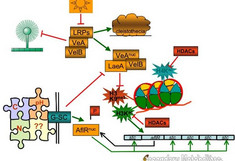Epigenetics
Project Part: Regulation of toxin biosynthetic genes and secondary metabolite production by chromatin structure and epigenetics in Fusarium graminearum
Our working hypothesis is that necrotrophic fungal pathogens like Fusarium produce a redundant set to of metabolites which can suppress defense responses in plants, causing the broad host range. Bioinformatic analysis of the available full genome sequence of Fusarium graminearum revealed that this organism possesses a large set of genes predicted to code for enzymes involved in secondary metabolite biosynthesis (polyketide synthases, ribosomal peptide synthases and terpenoid synthases). For most of the genes no corresponding metabolites are known. Recent work of our group using the ascomycetes Aspergillus nidulans as a model system revealed that fungal secondary metabolite gene clusters are under epigenetic silencing when the strains are grown in the laboratory. Manipulation of this silencing mechanism revealed the presence of novel, previously unknown Aspergillus metabolites. The goal of our project part is to use advanced functional genomics and metabolomics tools to study epigenetic phenomena and to identify new Fusarium metabolites with the potential to suppress defense.
Project Part Leader: Univ. Prof. Mag. Dr. Joseph Strauss

